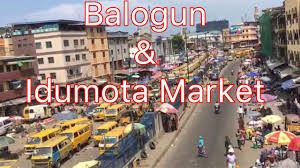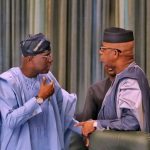
By allcitynews.ng culled from Punch
Kindly share this story:
Nigeria’s trade balance of manufactured goods hit a deficit of N9.4tn in the first nine months of 2023.
This is according to analysis of various Foreign Trade Statistics reports published by the National Bureau of Statistics.
According to the data, in the first quarter of 2023, Nigeria’s imports of manufactured goods stood at N2.5tn. In the second quarter, it increased to N3.2tn and N4.1tn in the third quarter.
Cumulatively, manufactured goods imports in the first nine months of 2023 stood at N9.9tn.
On the other hand, exports recorded in this category were N131bn, N212bn and N200bn in the first, second and third quarters, respectively, totalling N543bn.
This means that the difference between imports and exports during the period in review stood at a negative, as imports exceeded exports to the tune of N9.37tn.
Major items imported during the period included ‘Used Vehicles, with diesel or semi-diesel engines from the United States and United Arab Emirates, ‘Machines for reception, conversion and transmission … of voice, images or data’ imported from China and ‘Other medicaments not elsewhere specified’ from India.
The major exports in this sector were ‘Unwrought aluminium alloys’ exported to Japan, ‘Oilcake and other solid residues, resulting from the extraction of soyabean oil,’ and Cathodes and sections of cathodes’ exported to Japan.
The data revealed that manufactured goods exports by region were mainly exported to Asia, Africa and Europe.
According to a report by the Manufacturers Association of Nigeria, the highest non-oil export volume done by Nigerian businesses in recent times was $9.13bn and that was just before COVID-19.
The report said Nigeria had not done well in global export trade as it ranked 52nd among nations.
The report, titled ‘Emerging Issues Disrupting Nigeria’s Non-Oil Export And Innovative Solutions,’ cited production, port administration and operating environment as some of the primary impediments to non-oil exports in the country.
Also, a recent World Bank ‘Nigeria Development Update noted that non-oil revenues also need to be increased even with oil benefits being secured.
In an interview with Sunday PUNCH, the President of the Manufacturers Association of Nigeria, Francis Meshioye, said exporting manufacturers were usually unable to compete with their international counterparts due to factors bordering on high production costs.
According to him, Nigerian manufacturers are saddled with high production costs, which ultimately push up the prices of manufactured goods.
Meshioye said, “We tell our members to export more, but all these things are based on competitive advantages. If you want to export a product, it is fine, but at what cost are you going to export it? What will be your price? If the cost is astronomically high, it will be difficult to export. It is a circle.
“The export base should be good enough to support the floating exchange rate, but we need to have a good economic base to do that.”

For ADVERT Placement;
for EVENT Coverage;
Have story to PUBLISH;
HAVE Breaking story with pictorial evidence
OR wants to assist allcitynews.ng
by DONATIONS,
kindly contact us via ojezand@yahoo.com. Thank you.
Allcitynews.ng’s goal: To interface between policy makers & general public, most influential, informative and reliable issues-based online newspaper, working for unity, peace and development of the Country.
Disclaimer:
Comments expressed here do not in anyway reflect the opinions of allcitynews.ng or any employee thereof. It assumes no responsibility or liability for any errors or omissions in the comments.













More Stories
FIRS demands apology, condemns storming of its offices by FCTA officials over purported owing of rental payment
Commonwealth Tax administrators commend FIRS over exemplary leadership of Zacch Adedeji, contribution to Global Body
FIRS, cash cow responsible for fiscal sustainability of 3 tiers of government- RMAFC